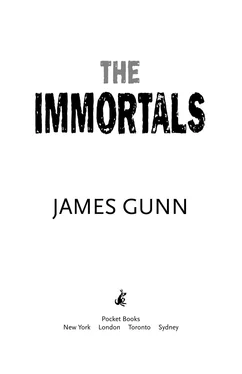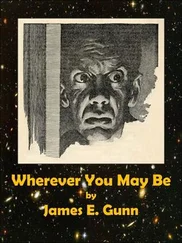There were movements and preparations. Harry couldn’t concentrate on them. Things blurred. Time passed like the movement of a glacier.
As the first gray light of morning came through the trees, Harry felt life moving painfully in his little toe of his left foot. It was worse than anything he had ever experienced, a hundred times worse than the pain from the bracelet. The pain spread to his other toes, to his feet, up his legs and arms toward his trunk. He wanted to plead with Pearce to restore the paralysis, but by the time his throat relaxed, the pain was almost gone.
When he could sit up, he looked around for Marna. She was leaning against a tree trunk, her eyes closed, looking paler than ever. “Marna!” he said. Her eyes opened wearily; an expression of joy flashed across them as they focused on him, and then they clouded.
“I’m all right,” she said.
Harry scratched his left elbow where the transfusion needle had been inserted. “I don’t understand—you and Pearce—you brought me back from that—but—”
“Don’t try to understand,” she said. “Just accept it.”
“It’s impossible,” he muttered. “What are you?”
“The governor’s daughter.”
“What else?”
“A Cartwright,” she said bitterly.
His mind recoiled. One of the Immortals! He was not surprised that her blood had counteracted the poison. Cartwright blood was specific against any foreign substance. He thought of something. “How old are you?”
“Seventeen,” she said. She looked down at her slender figure. “We mature late, we Cartwrights. That’s why Weaver sent me to the Medical Center—to see if I was fertile. A fertile Cartwright can waste no breeding time.”
There was no doubt: She hated her father. She called him Weaver. “He will have you bred,” Harry repeated stupidly.
“He will try to do it himself,” she said without emotion. “He is not very fertile; that is why there are only three of us—my grandmother, my mother, and me. Then, too, we have some control over conception—particularly after maturity. We don’t want his children, even though they might make him less dependent on us. I’m afraid”—her voice broke—“I’m afraid I’m not mature enough to prevent conception.”
“Why didn’t you tell me before?” Harry demanded.
“And have you treat me like a Cartwright?” Her eyes glowed with anger. “A Cartwright isn’t a person, you know. A Cartwright is a walking blood bank, a living fountain of youth, something to be possessed, used, guarded, but never really allowed to live. Besides”—her head dropped—“you don’t believe me. About Weaver.”
“But he’s the governor!” Harry exclaimed. He saw her face and turned away. How could he explain? You had a job and you had a duty. You couldn’t go back on those. And then there were the bracelets. Only the governor had the key. They couldn’t go on for long linked together like that. They would be separated again, by chance or by force, and he would die.
He got to his feet. The forest reeled for a moment, and then settled back. “I owe you thanks again,” he said to Pearce.
“You fought hard to preserve your beliefs,” Pearce whispered, “but there was a core of sanity that fought with me, that said it was better to be a whole man with crippled beliefs than a crippled man with whole beliefs.”
Harry stared soberly at the old man. He was either a real healer who could not explain how he worked his miracles, or the world was a far crazier place than Harry had ever imagined. “If we start moving now,” he said, “we should be in sight of the mansion by noon.”
As he passed the dwarf, he looked down, stopped, and looked back at Marna and Pearce. Then he stooped, picked up the misshapen little body, and walked toward the road.
The helicopter was beside the turnpike. “It would be only a few minutes if we flew,” he muttered.
Close behind him Marna said, “We aren’t expected. We would be shot down before we got within five miles.”
Harry strapped the dwarf into the helicopter seat. The ghoul stared at him out of hate-filled eyes. Harry started the motor, pressed the button on the autopilot marked Return, and stepped back. The helicopter lifted, straightened, and headed southeast.
Christopher and Pearce were waiting on the pavement when Harry turned. Christopher grinned suddenly and held out a rabbit leg. “Here’s breakfast.”
They marched down the turnpike toward Lawrence.
* * *
The governor’s mansion was built on the top of an L-shaped hill that stood tall between two river valleys. Once it had been the site of a great university, but taxes for supporting such institutions had been diverted into more vital channels. Private contributions had dwindled as the demands of medical research and medical care had intensified. Soon there was no interest in educational fripperies, and the university died.
The governor had built his mansion there some seventy-five years ago when Topeka became unbearable. Long before that it had become a lifetime office—and the governor would live forever.
The state of Kansas was a barony—a description that would have meant nothing to Harry, whose knowledge of history was limited to the history of medicine. The governor was a baron, and the mansion was his keep. His vassals were the suburban squires; they were paid with immortality or its promise. Once one of them had received an injection, he had two choices: remain loyal to the governor and live forever, barring accidental death, or die within thirty days.
The governor had not received a shipment for nearly four weeks. The squires were getting desperate.
The mansion was a fortress. Its outer walls were five-foot-thick prestressed concrete faced with five-inch armor plate. A moat surrounded the walls; it was stocked with piranha. An inner wall rose above the outside one. The paved, unencumbered area between the two could be flooded with napalm. Inside the wall were concealed guided-missile nests.
The mansion rose, ziggurat fashion, in terraced steps. On each rooftop was a hydroponic farm. At the summit of the buildings was a glass penthouse; the noon sun turned it into silver. On a mast towering above, a radar dish rotated.
Like an iceberg, most of the mansion was beneath the surface. It went down through limestone and granite a mile deep. The building was almost a living creature; automatic mechanisms controlled it, brought in air, heated and cooled it, fed it, watered it, watched for enemies and killed them if they got too close…
It could be controlled by a single hand. At the moment it was.
The mansion had no entrance. Harry stood in front of the walls and waved his jacket. “Ahoy, the mansion! A message for the governor from the Medical Center. Ahoy, the mansion!”
“Down!” Christopher shouted.
An angry bee buzzed past Harry’s ear and then a whole flight of them. Harry fell to the ground and rolled. In a little while the bees stopped.
“Are you hurt?” Marna asked quickly.
Harry lifted his face out of the dust. “Poor shots,” he said grimly. “Where did they come from?”
“One of the villas,” Christopher said, pointing at the scattered dwellings at the foot of the hill.
“The bounty wouldn’t even keep them in ammunition,” Harry said.
In a giant, godlike voice the mansion spoke: “Who comes with a message for me?”
From his prone position, Harry shouted, “Doctor Harry Elliott. I have with me the governor’s daughter, Marna, and a leech. We’re under fire from one of the villas.”
The mansion was silent. Slowly then a section of the inside wall swung open. Something flashed into the sunlight, spurting flame from its tail. It darted downward. A moment later a villa lifted into the air and fell back, a mass of rubble.
Читать дальше












